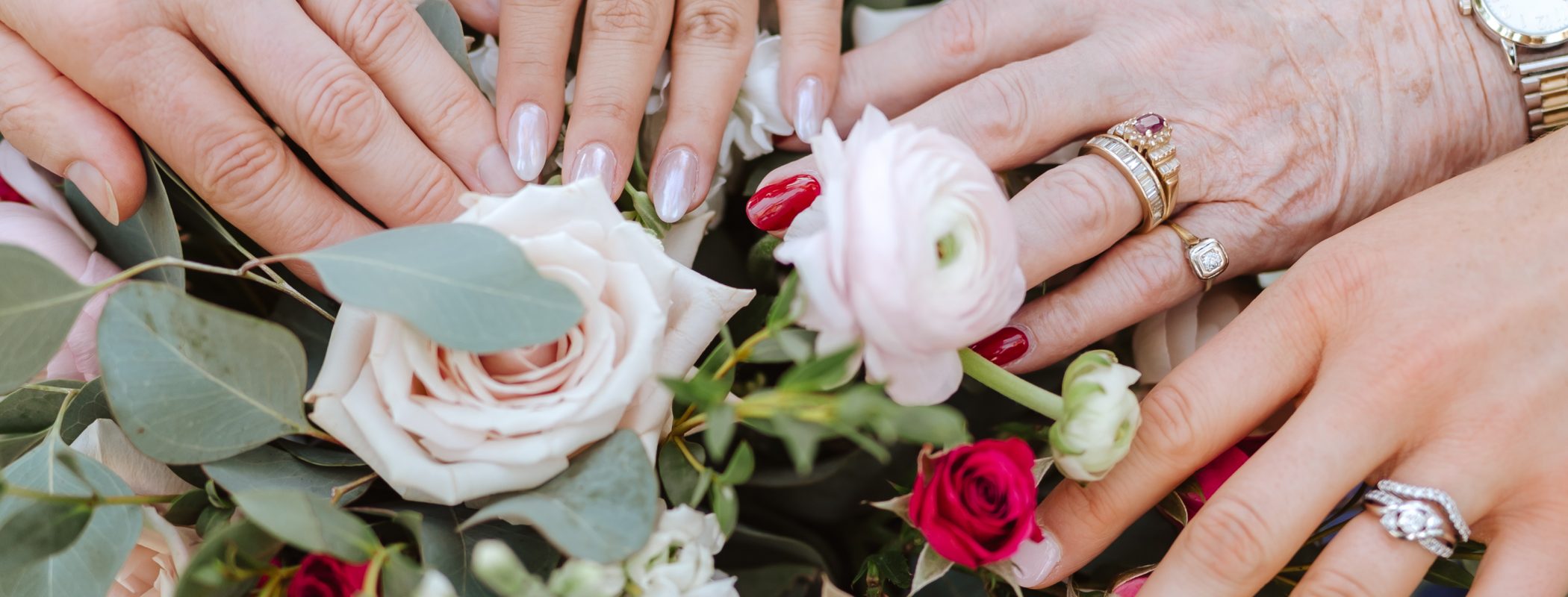
5 Key Things to do After Getting Engaged!

Your partner finally popped the question, and you said yes—congratulations! What an exciting and magical moment in your life! Take some time to savor the love and happiness surrounding you. This is a time to celebrate, so gather your closest friends and family to share the good news, and don’t hesitate to show off your stunning new ring. While wedding planning can feel a bit overwhelming at first, don’t worry—we’re here to guide you through the first few steps to give you a running head start!
Get your Ring Sized & Insured

Every ring is as unique as the finger it’s meant for. Even if you provided your partner with your ring size, there’s still a chance it may not fit perfectly! Whether it’s a bit too loose, risking the possibility of slipping off, or too tight, causing discomfort, it’s important to have it sized to fit you just right. To ensure the perfect fit, we recommend taking your ring back to where it was purchased or to a trusted jeweler, where professionals can work their magic and make any necessary adjustments.
Though no one ever plans on losing their engagement ring, life has a way of surprising us. That’s why having insurance for your ring is a smart move—it can cover loss, theft, and even damage to the stones. Knowing that your precious piece is insured offers peace of mind and helps protect you in case the unexpected happens. To start, get an appraisal and grading report to better understand its value, which will ensure you have adequate coverage. When choosing an insurance provider, it’s important to do your research. Request multiple quotes to compare options, and ask key questions such as:
- Will the policy adjust according to inflation?
- Who chooses where the ring can get repaired or replaced?
- Does it continue coverage when traveling outside of the country?
Finally, check with your homeowner’s or renter’s insurance to see if you can purchase an extension that would cover your ring specifically. It’s always better to be safe rather than sorry!
Create a Spending Plan

Grab your favorite drink, settle in with some snacks, and get comfortable—it’s time to sit down with your fiancé and discuss your vision for the big day. Do you both dream of a grand celebration with all your family and friends, or are you leaning toward something more intimate? Take the time to talk about what matters most to each of you, and list out those priorities. One of the trickier conversations to have is about finances—who will be responsible for the costs? Often, parents or close family members are willing to contribute, either with a set amount or a percentage. It’s worth exploring whether they might be open to covering specific vendors or aspects of the wedding. Once you have a clear understanding of your total spending plan, it becomes much easier to allocate funds to the key areas. Your venue and catering will likely be your biggest expenses, but there are plenty of other elements that will make your wedding day truly unforgettable. Here’s a list of the other essential items to consider:
- DJ or Band
- Photography & Videography
- Florals
- Alcohol
- Rings & Attire
- Wedding Planner
- Rentals & Decor
- Rehearsal Dinner
- Hair & Makeup
- Cake & Desserts
- Guest Entertainment & Favors
- Stationary
- Officiant
- Transportation & Accommodations
- Wedding Party Attire
There are plenty of opportunities to save money in each category, but at the end of the day, you get what you pay for. Some services are worth every penny, while others may not justify the cost. Use the priorities you and your fiancé discussed to guide your decisions, ensuring that the most important elements of your wedding receive the attention and budget they deserve. By aligning your spending with what truly matters to both of you, you can create a celebration that feels meaningful without sacrificing quality where it counts.
Build Your Guest List

Before you start touring venues and reaching out to vendors, it’s essential to have a rough idea of how many guests you’ll be inviting, as most venues base their pricing on guest count. A great way to manage this is by using a spreadsheet (Google Sheets or Excel) to track your guest list. You can easily categorize important details like addresses, RSVPs, entrée choices, and other key information. While it’s natural to consider family expectations and friends’ feelings, remember that this day is about you and your fiancé—so focus on the people you truly want to share this special moment with.
It’s possible that your dream venue may have a guest limit, so it helps to categorize your guest list into tiers to make narrowing down the numbers easier. Start with your A-List—these are the must-haves, the people who are non-negotiable, including your immediate family, wedding party, and their plus-ones. Next, your B-List includes close family and friends you’d love to invite and might consider giving plus-ones. Finally, the C-List consists of people you’d like to invite if space and spending plans allow. If parents are contributing to the budget, it’s a general rule of thumb for them to have a say in a small portion of the guest list, but every situation is different.
To further manage your guest count, consider limiting plus-ones or making the celebration adults-only—kids can quickly add up! When it comes to RSVPs, expect about a 60-70% “Yes” rate, depending on how many out-of-town guests you have. Being strategic and organized now will help ensure your guest list aligns with both your vision and your spending plan.
Narrow Down a Date or Time of Year

When choosing your wedding date, there are several important factors to consider. Start by discussing with your partner how long of an engagement you both would like. Typically, engagements last between 1-2 years, but they can be shorter or longer depending on your timeline and how much time you’d like for planning. Once you have a general sense of your engagement length, here are a few key things to consider as you begin narrowing down your date:
- Weather
Consider the temperature range and typical weather for the time of year you’re planning. Think from your guests’ perspective—will the weather be comfortable for everyone? If it’s a particularly hot or cold season, you might want to make accommodations to ensure comfort, like providing fans or blankets. Also, check if it’s during the rainy season. It’s always smart to have a solid backup plan in case of unpredictable weather! - Holidays
If your wedding falls near a major holiday, keep in mind that it could affect both travel and accommodation costs for out-of-town guests. Additionally, consider any large, annual events in your area that could increase tourist traffic and make logistics more complicated. On the flip side, some couples intentionally choose dates close to a holiday, knowing that their guests will likely have more time off work, making travel easier. - High Season vs. Low Season
Most venues and vendors experience a peak season when demand is high and prices reflect that. If you’re aiming for a specific time of year, be aware that weekends, particularly during high season, tend to book up quickly. Weekdays and off-peak seasons, on the other hand, may offer more availability and more affordable pricing. - Special Dates
For some couples, picking a date that holds personal significance adds an extra layer of meaning to the day. Consider dates like your anniversary, the day you first met, or even the day of your first kiss. These sentimental dates can make your wedding day even more special and memorable.
Finally, decide how flexible you and your partner are willing to be. If there’s a specific date that’s deeply meaningful to you, be prepared to be more flexible with your venue options if that date isn’t available. At the end of the day, the date should work best for both of you—after all, it’s about celebrating your love, on your terms!
Start Venue Shopping!

One of the most exciting aspects of your engagement era is selecting the perfect venue! Now’s the time to revisit those priorities you and your fiancé discussed and envision what your wedding day will look like. Do you dream of an outdoor ceremony, or are you leaning toward an all-inclusive venue? Whatever your vision, there’s a venue out there that’s just right for you—it just takes a little research to find it!
Before scheduling a site tour, it’s essential to have phone consultations with the venues that interest you most. This will help you ensure they align with your spending plan and can accommodate your guest list. Pay attention to how you feel during these conversations. The right venue should make you feel valued and excited, as if they are eager to help bring your vision to life! Once you’ve narrowed it down to a handful of options, it’s time to schedule those in-person tours and get a feel for the space.
Here are some key questions to ask during your venue tours:
- If the ceremony is outdoors, what’s the backup plan in case of bad weather?
- What services do they provide on the day of the event, and what are you responsible for?
- What dates are available for the time of year you’re considering?
- How many hours do you get access to the property?
- What is the initial payment to secure your date, and how is the remainder of the payment structured? Are any payments refundable?
- Are there any additional fees, such as service charges, gratuity, or cake-cutting fees?
After touring the venues, it’s always a good idea to sleep on it and trust your gut. The venue should be a place that makes your wedding planning smoother, not adding more to your plate. Choose the one that feels like the perfect fit and gets you excited for the big day ahead!
Photography:
Featured Image: Andrea Neff Photography
1, 2, & 3 – Andrea Neff Photography
4 – Tiffany & Ryland Photography
5 & 6 – Tony George Photography
